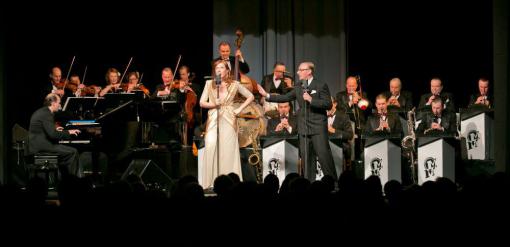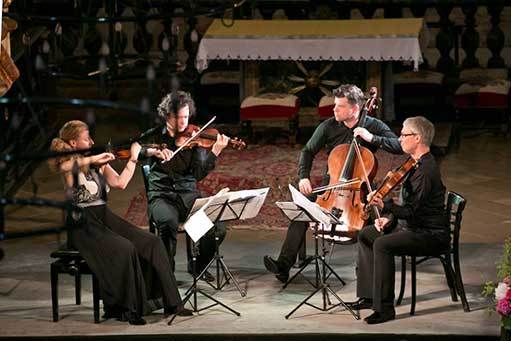The Concentus Moravie – an annual music festival of a number of iconic and historically significant towns in South Moravia and the adjacent districts, including Austria – was held for the 21st time. Even after two decades, the entire event seems to be a bit of a revelation and it is difficult to find a suitable comparison.
At the very beginning, Concentus Moraviae came with a million-dollar idea: not to force its way onto the relatively happy Brno scene, but instead place the concerts in venues that themselves are extraordinary and duly ignored by the residents of Brno. It used the favour of mayors but the idea was not simply a commercial start-up: an ambitious production plan was always implemented and strictly observed in the particular local conditions. The event never lacked musicians who belong among the absolute global elite in their specialisations. The organisers have knowledge of the current music scene and, instead of celebrities past their performance peak, they manage to invite young artists who represent the true performance peak. It is rare in the Czech environment.
Great world of music in small towns
Concentus Moraviae is overall an extremely non-Czech festival. With its focus and overall level, it would instead fit right in Switzerland, southern France or England, where it would be an elite social event for the upper classes. Therefore, it is appropriate to talk about a revelation: the artistic insight of the mayors – and there is no shame in it – would have been initially certainly satisfied with fairground attractions such as Václav Hudeček or Jaroslav Svěčený. Yet, they get what is unique even when compared to the world's music capitals such as London, Vienna and New York.
 The annual events focusing, for example, on French music (1999), Slavic music (2001) and musical migration (2005) were truly unique in terms of production and gave the word festival a new meaning. Especially in the field of older music, on which the Concentus often focuses, it was clearly not a problem to invite any ensemble and therefore even Musica Antiqua Köln (Tišnov) performed at this event, not to mention the regular performances of Magdalena Kožená.
The annual events focusing, for example, on French music (1999), Slavic music (2001) and musical migration (2005) were truly unique in terms of production and gave the word festival a new meaning. Especially in the field of older music, on which the Concentus often focuses, it was clearly not a problem to invite any ensemble and therefore even Musica Antiqua Köln (Tišnov) performed at this event, not to mention the regular performances of Magdalena Kožená.
It is not clear why someone so generously spends their energy – and undoubtedly also funds – in the Czech Republic. In a country that is leaning away from its musical traditions and where the prevailing social ambition is sufficient, satisfactory or "bearable" quality. In a country where many musical institutions eventually choose not to build a meaningful production just to replace it with the presentation of music as luxury goods for the "higher" society. Hopefully someone famous comes and plays something that everyone knows. Everything else is secondary.
Penetration of top Czech and world's quartets in Moravia
The most valuable achievements of the 21 years of the event also include this year's tribute to the string quartet, its Czech interpretation tradition as well as to the creative legacy of Beethoven and Shakespeare. Beethoven's pieces that were played included mainly the complete quartet piece including 16 generally quite difficult sections. A representative selection of ensembles performed, mainly in the composition of the world's youngest quartet generation (7 instruments), including most professional Czech quartets. The residential ensemble (four programmes, five concerts and interpretation master classes) was the Slovak-Czech Pavel Haas Quartet, a follower of Milan Škampa's Prague class and therefore a sovereign successor of the Czech quartet tradition. They are among the most sought-after ensembles of today and only rarely perform in the Czech Republic.
The festival brought 35 concerts during June, so each member of the audience had their own unique festival experience – not too many people find the time to travel to all performances. I chose thirteen concerts, which I did not want to miss and to eight of which I eventually went, roughly a quarter of the festival events (some performances are repeated). These concerts included four Czech quartets (twice Hass, once Zemlinský, Matinů and Ištvan Quartets), two truly international performances (Meccore, Van Kuijk) and as a bonus the final performance of the newly created Czech Philharmonic Chamber Orchestra. My testimony and assessment is therefore not even close to covering everything that this year's Concentus offered but a few things are clear.
It was confirmed that a pair of successful domestic ensembles, the Haas Quartet and the Zemlinský Quartet, are among the best in the world. Although they are both developing the Czech quartet tradition, it is hard to imagine two more different worlds. The Hass Quartet deservedly have the world of chamber music at their feet: in their performances, they strive to reach expressive, dynamic and tempo extremes, they do not seek balance, they prefer the intensity of the experience and give it their all.
The eccentric performance of the Hass Quartet may drive knowledgeable traditionalists crazy, but the search for new expressive and technical possibilities is legitimate and desirable. At first glance, the lead player is the cellist Peter Jarůšek (similarly as the cellist Antonín Kohout in the legendary Smetana Quartet, whose violist was the aforementioned teacher and mastermind of the Hass Quartet, Milan Škampa). He does not dynamically step back in his play and the others try to come near the fullness of the sound of the cello, creating their unmistakable sound. The first violin of Veronika Jarůšková is sharp in sound and protrudes intentionally, but without excessive forza or vibrato.
It is hard to imagine a more appropriate ensemble to perform Shostakovich's Eighth or Smetana's Second Quartet (both in Žďár nad Sázavou), while searching for the pianissimo extremes in Dvořák's "American Quartet" in the non-acoustic Kyjov Social House somewhat dampened Dvořák's spontaneity. It is also necessary to mention their electrifying eye contact, thanks to which the concert would have been certainly enjoyable even for the old Beethoven or Smetana.
In contrast, the Zemlinský Quartet strives for a very traditional performance with an emphasis on perfectly mastered technique, perfect execution of much agogic finesse and a widely developed melodiousness of all melodic parts. The viola of Peter Holman is slightly dominating with a certain player insight. During the performance, he also communicates with the audience the most, while the performance of cellist Vladimir Fortina is mild, velvety, submissive and the sound is always dominated by both violins.
Both ensembles traditionally sit during the performance while the Polish Meccore String Quartet, my most terrific festival experience of the year, were sitting in the Třebíč Rear Synagogue, except the cellist, consistently alternating violin parts between compositions so that nobody was first or second. It could have also been due to the space, which indeed seems to be optimal for the sound of a quartet, and the selection of compositions (Penderecki, Szymanowski, Beethoven's Op. 18/4), but the young Polish man showed the perfect functioning of all aspects of performance and harmony, a disarming full colour of sound and sense for the construction of an intense psychological experience.
All concerts have a pleasant and relaxed atmosphere, also benefiting from the fact that the appearance of the towns of South Moravia and the surrounding areas is much more dignified than 20 years ago. Touring and exploring them is a real treat. Eliminating breaks turned out to be a positive step compared to the June summer restlessness. Jiří Beneš and Aleš Březina worked together to prepare this year's production and brought a fascinating mix of stubbornness, consistency and activity. The insightful, detailed and beautifully worded texts written by Jiří Beneš in printed programmes and in the catalogue served as a pleasant festival guide.
The inclusion of Brno among the official festival cities and towns is quiet news this year. Several Concentus evenings have been held there in the past, but mostly for practical reasons. It would be a mistake for the city to approach its participation in the festival of towns and villages only symbolically. On the contrary, it should actively and consistently with the nature of the event promote the event's noteworthy features: large spaces for major concerts, including symphonic and oratorio, smaller spaces for unique events, such as the Tugendhat, Stiassni, Löw-Beer Villas and other venues.
When thinking back to the first few years of Concentus Moraviae, one remembers a much greater share of audience from Brno. Transportation from Brno was provided to all concerts and the streets of Brno were dominated by visual presentation. Now, Concentus is firmly engraved in the cultural calendars of individual cities and the attendance of the events seems to be high. Yet, it is a mistake to give up on the greater involvement of the residents of Brno and local tourists, and mainly it is a shame. The Czech music scene does not offer anything more attractive, at least not in June.
Concentus Moraviae Festival, 21st annual event dedicated to Beethoven, Czech quartet tradition and Shakespeare. 1 – 28 June 2016
































No comment added yet..